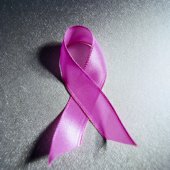
TUESDAY, Sept. 6 (HealthDay News) — Breast cancer patients with the BRCA1 gene mutation have a much better response to neoadjuvant chemotherapy — chemo given before other treatment — than other breast cancer patients, a new study finds.
U.S. researchers looked at 317 patients with different stages of breast cancer who underwent neoadjuvant chemotherapy.
Complete pathological response (pCR) — the disappearance of all evidence of cancer from the breast tissue and lymph nodes — occurred in 46 percent of those with the BRCA1 mutation, 13 percent of those with the BRCA2 mutation, and 22 percent of patients with neither mutation, the study authors found.
BRCA1 carriers who achieved a pCR after neoadjuvant chemotherapy also had a better five-year, relapse-free survival and overall survival rates, although the latter difference was not statistically significant, said the University of Texas M.D. Anderson Cancer Center researchers.
After neoadjuvant chemotherapy, 61 patients had breast-conserving surgery and 256 underwent mastectomy.
“While hereditary breast cancers typically carry aggressive tumor features compared to sporadic [non-inherited] breast cancers, we found that BRCA1-related tumors were as responsive and sensitive to anthracycline and taxane-based chemotherapy as were sporadic breast cancers,” lead author Dr. Banu Arun, a professor in the department of breast medical oncology, said in an M.D. Anderson news release. “These findings may help physicians determine the best treatment method for this subset of women with unique genetic mutations.”
The study is published in the Sept. 6 online edition of the Journal of Clinical Oncology.
A lack of prospective studies means there is no consensus on the most effective chemotherapy regimen for breast cancer patients with a BRCA1 mutation, according to Arun.
“This new insight tempts us to speculate that the presence of the BRCA1 mutation determines how some women will respond to neoadjuvant chemotherapy. However, we need future prospective studies with larger cohorts and longer-term follow up to validate these findings and determine optimum treatment,” Arun said in the news release.
More information
The U.S. National Cancer Institute explains adjuvant and neoadjuvant therapy for breast cancer.

